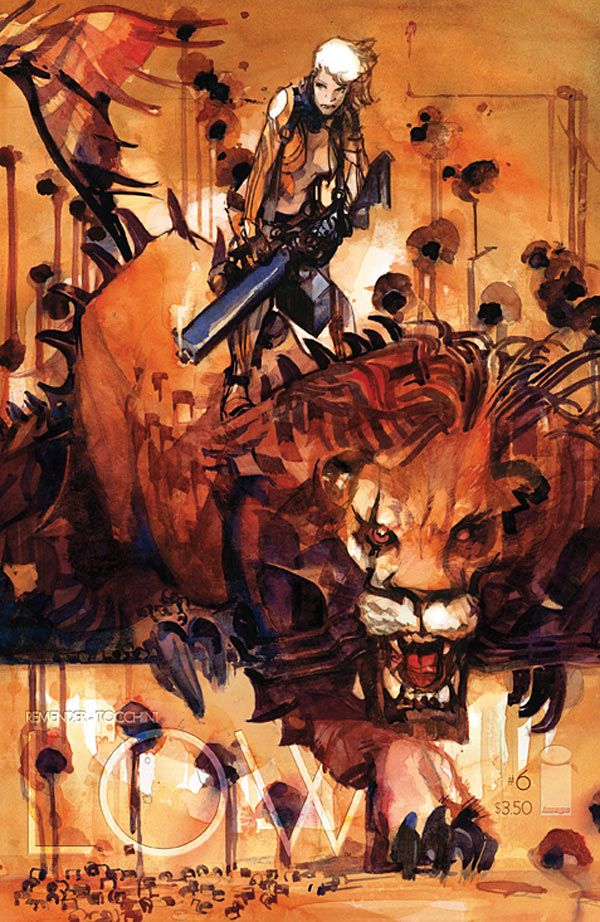"Low" #6 brings Rick Remender and Greg Tocchini's first arc to a lavish, exhilarating conclusion. In a sea of unfurling red and orange, Stel and Marik struggle to retake control from Roln but, as enemies and monsters close in, the only possible victories are Pyrrhic. Tocchini's airy linework and cloudy, bleeding colors create a handsome, harrowing setting, and Remender's script stays tense and surprising throughout. Altogether, "Low" reads like a big-budget blockbuster: heart-pounding and eye-pleasing but befuddled at its emotional core. If Remender can smooth out his character arcs, "Low" could become something truly exceptional but, for now, it's still a rollercoaster of a read.
The beauty and efficiency of this issue are undeniable. Greg Tocchini's muddied, evocative artwork never fails to impres, and issue #6 is as alien and lovely as its predecessors. It can admittedly be unclear: the action scenes are more like swirling tempests than readable sequences, and it's likely to frustrate certain readers. I love how the cloudy, impressionistic colors make the whole world feel like it is indeed underwater and, while I'd like the women to wear some more clothes, the character designs are decadent and foreign enough to establish the world.
As far as the script, Remender knows how to pick a beat and every scene feels crucial, on the brink of terrible or triumphant possibilities. There is so little waste and, as a result, the issue accelerates steadily and stirringly to its climax. I'm jealous of anyone who'll get to read issues #5 and #6 right in a row when they're collected in trade.
For all this skill, though, Remender is still too obvious with his themes. Lines like "Always serve your own truth" and "What if I told you anything was possible? That conquering the fear in your heart could change everything?" are rather heavy-handed and, at this point, the reader gets it. In addition, Roln's visceral hatred for the very concept of optimism is much less compelling than if he raged against -- or for -- something concrete. His fixation on crushing hope, rather than actual opposition, gives him a cartoonishness that makes him less fearsome.
Most worrying, it seems like Remender focuses on speeches about optimism as a substitute for character development. Stel and Marik don't have meaningful conversations about anything except the nature of free will and hope. Given all the family drama and the impending end of the species, I'd hope that they could find something else to explore, but they don't confront those questions directly.
Marik's redemption narrative especially comes off as a bit cloying and unearned. Remender tries to pass credit for Marik's determination to Johl, filling the issue with flashbacks to his fatherly advice, but all those childhood speeches didn't keep Marik from cheating and killing women a few issues ago. Remender doesn't address this descent meaningfully -- Marik simply says "I'd collapsed under the weight of [my burdens]" -- and it seems like he expects the reader to forget this storyline.
Despite my reservations, "Low" has such a cool world, and Remender isn't afraid to challenge his characters and let them struggle. I appreciate that bravery, and it bodes well for the next arc. However, the real benefit of putting characters through the ringer is that we get to see them develop; here's hoping there's more of that on the way.

